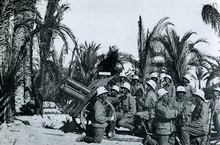10 cm Gebirgshaubitze M 8
This article includes a list of references, related reading or external links, but its sources remain unclear because it lacks inline citations. (February 2013) |
| 10 cm M. 8 Gebirgshaubitze | |
|---|---|
 M.10 at an Italian military cemetery | |
| Type | Mountain howitzer |
| Place of origin | Austria-Hungary |
| Service history | |
| Used by | |
| Wars | World War I |
| Specifications | |
| Shell | 14.3 kg (31 lb 8 oz) |
| Caliber | 104 mm (4.1 in) |
| Breech | Horizontal sliding-wedge |
| Carriage | Box trail |

The 10 cm Gebirgshaubitze M 8 was a mountain howitzer used by Austria-Hungary during World War I. It was the first Austrian howitzer to use a modern hydraulic variable-recoil system. It used the same ammunition as the earlier 10 cm Gebirgshaubitze M 99, which was shown to be accurate, but lacked sufficient power to destroy bunkers, during World War I. It had a gun shield. It could be mounted on a special sled carriage designated 10 cm M. 8 Gebirgsschleife designed to allow for high-angle fire between +43° and 70° elevation. This sled was transported on a special bedding cart with removable wheels. The wheels were removed when in position to fire.
The 10 cm Gebirgshaubitze M 10 was virtually identical except that it had its traversing and elevating handwheels on different sides and it was not given a high-angle mount.
References[]
- Ortner, M. Christian. The Austro-Hungarian Artillery From 1867 to 1918: Technology, Organization, and Tactics. Vienna, Verlag Militaria, 2007 ISBN 978-3-902526-13-7
- 10 cm M.8 und M. 10 Gebirgshaubitze. heeresgeschichten.at. Retrieved 28 January 2014.
- World War I howitzers
- Mountain artillery
- World War I mountain artillery
- World War I artillery of Austria-Hungary
- 104 mm artillery
- Artillery stubs